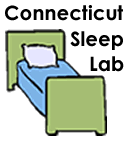Frequently Asked Questions
Is the Connecticut Sleep Lab accredited?
Yes, the Connecticut Sleep Lab is recognized by the American Academy of
Sleep Medicine (AASM) as an accredited sleep center.
How do I make an appointment at your facility?
If you would like to come to the Connecticut Sleep Lab to address a
sleeping problem, you must get a referral from your doctor. Please ask
your physician to call the Connecticut Sleep Lab to send us his or her
referral. At that point, we will contact you to setup an appointment.
Are studies done overnight? How long do they last?
Yes, most diagnostic studies are performed overnight at the lab. Most
patients will stay in the lab for a total of 10 or 11 hours. This time
not only includes sleeping, but filling out paperwork and being prepped
for the study.
What should I bring to a study?
In the most simple sense, you should bring whatever you need to sleep.
Be sure to bring some loose fitting clothes (pajamas) and whatever else
you may need such as a toothbrush and/or contact lens solution. Towels
and sheets will be provided for you.
Our goal is to make your experience at the Connecticut Sleep Lab as comfortable and pleasant as possible. As you will see, the bedrooms look much like typical bedrooms and are outfitted with cable television and DVD players, which can also play CDs. We invite you to bring DVDs, CDs, stuffed animals, your own pillows, or any other non-intrusive things that typically help you sleep (no pets please).
I need to go straight to work, can I shower at the lab?
Yes, there is a shower at the lab with soap, shampoo, and conditioner. Bath towels are also available.
I cannot sleep in a bed, do you offer an alternative?
Yes, we have recliners that can be kept upright or be fully reclined.
Please let us know in advance if you will need to use one rather than a
bed.
I cannot sleep without my bed partner, can he/she come to the study?
In order to attain accurate results from the test, we cannot allow
patients to have someone sleep in the bed with them, although you may
have a bed partner or aide sleep in the same room with you. He or she
will have to sleep in the recliner or bed, whichever you do not use.
How can I lean more about sleep and sleep disorders?
Please visit our Tumblelog to learn more about sleep. We update this often, so please visit it frequently.
